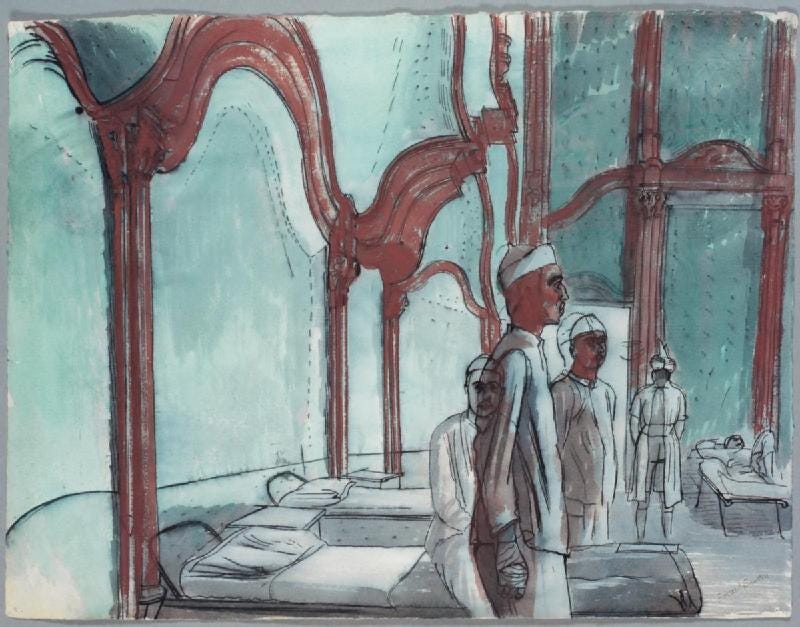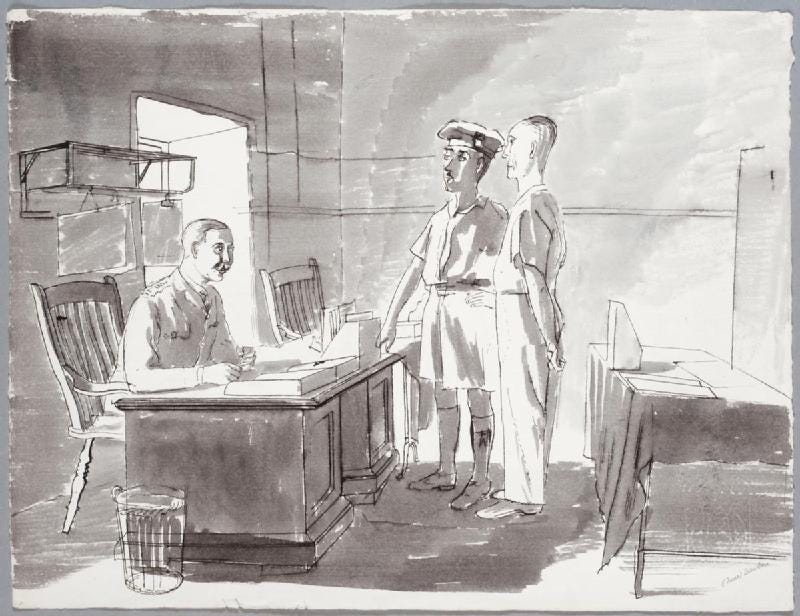This piece was the first ever published by the Republic of Letters (March 2025).
Of all the characters in Olivia Manning’s Balkan Trilogy, her three-volume chronicle of the early moments of the Second World War, none are better named than Foxy Leverett. Alas, the name’s bearer does not deliver on its promise of cunning. Found in a heap at the side of a Romanian road, news of his death reaches the dwindling British enclave of 1941 Bucharest and is met with a shrug. Foxy, after all, knew the rules of the game. Foxy was a spy.
Dead by the side of the road is also a fair summation of Olivia Manning’s reputation today. Like many of her characters, she seems to have been quietly left behind. Anthony Powell, one of her editors, called her “the world’s worst grumbler.” Ivy Compton-Burnett dismissed her novels as “travel books.” Her nickname in 1960s literary London? Olivia Moaning.
Even her Wikipedia page has the flavour of a drive-by shooting. The Early Years section alone is enough to put her away for life. First, we learn of her devotion to a womanising father. Then her delight in hurting her sickly brother as a baby. Next, school: “shy and prone to tantrums,” with a “tendency to tell boastful tall-tales.” The result? Total “ostracism by her peers.”
To be fair, Manning earned the nickname. But only just. Her early life reads, to me at least, as quietly heroic: she escaped an unhappy home, read obsessively despite her parents’ scorn, published short stories under a pseudonym, then fled to a Chelsea bedsit and began again. She was, as any obituary writer might put it, not one to suffer fools. Hyper-attuned to slights in reviews, obsessed with the Booker, prone to inserting herself into conversation and copy alike, she made an easy target.
Only a handful of Manning’s books remain in print, and of those, just six are read. They form two trilogies: The Balkan Trilogy and The Levant Trilogy. Together, they follow a young couple, Guy and Harriet Pringle, who, after a whirlwind romance, arrive in Romania just before the outbreak of war. Guy teaches English literature under the auspices of the British Council. Harriet, newly married, isn’t entirely sure what she’s signed up for.
The year is 1939. Over the course of the series, the Pringles move from Romania to Greece to Egypt, watching, largely helpless, as what Manning calls “the disintegration of their adoptive world” unfolds around them. History closes in. The German army marches onward. And the couple find themselves stranded on the wrong side of the world.
Reviews of the books tend to follow a familiar formula. First, Manning takes a few body-blows, normally by quoting, as I do above, some of her contemporaries. Then comes the comparison to the other great British Second World War cycles: Waugh’s Sword of Honour and Powell’s Dance to the Music of Time. Some begrudging praise is offered. Disapproval follows swiftly.
But if I were to think of an analogue for Harriet Pringle, our main protagonist, I wouldn’t reach for Nick Jenkins or Guy Crouchback, but for one of the characters of Maugham, Le Carré or Deighton. It’s here the resemblance truly lives, even in the most minor of characters. Take the first one we meet in Tinker, Tailor, Soldier, Spy. Not George Smiley or Bill Haydon, but Roach, one of the boys at the school Jim Prideaux teaches at after his fateful encounter in Czechoslovakia.
Both Roach and Pringle come from broken homes. Le Carré approaches this obliquely. Manning wants us to wallow in it:
‘“I haven’t any parents. At least, none to speak of. They divorced when I was very small. They both remarried and neither found it convenient to have me. My Aunt Penny brought me up. I was a nuisance to her, too, and when I was naughty she used to say: ‘No wonder your mummy and daddy don’t love you.’”
Both Pringle, Roach, and the whole cast of assorted rogues who make up the canon of the 20th century spy novel all have this in common. Because, as Le Carré understands best, it’s only from the most broken of homes come the greatest of watchers.
“You’re a good watcher, anyway. I’ll tell you that for nothing old boy. Us singles always are — no one to rely on.”
Manning was a self-confessed watcher: “I write out of experience, I have no fantasy. I don't think anything I've experienced has ever been wasted.” She is often shelved among the great war novelists. But for my money, she belongs to a different tradition entirely: the spy novel. Not in plot, perhaps. There’s enough of it in her work thanks to the ragtag bunch of stringers, casuals, and spooks that make up Harriet Pringle’s circle of friends. But it’s in sensibility that the real case lies.
Because what Manning understands — what all great spy novelists understand — is that the most important observations are private. Domestic. Even emotional. Whether it’s Maurice and Sarah Castle, George and Ann Smiley, or Bernard and Fiona Samson, every great spy novel needs an emotionally knotted spy couple to boot. Manning, with the marriage that is the centrepiece of her series, just got there first. The same is true in film. See also Black Bag, Steven Soderbergh’s new entry to the genre.
And it’s this that makes her such an unnervingly great writer. She watches the world, the people around her, and her marriage, in a detail almost unmatched in twentieth-century fiction.
That eye was no invention. The Balkan and Levant Trilogies are what we’d now call autofiction. Manning, like Harriet, married a young English lecturer. They moved to Romania. Then to Greece. Then to Egypt. The world she recorded wasn’t imagined. It was remembered. Harriet Pringle’s story is, quite directly, Manning’s own.
In the Balkan Trilogy, the summer of 1939 finds Harriet, the narrator, married and on a train to Romania, with a husband she hardly knows. They are poorly suited. Guy is an unreconstructed idealist. Harriet is an arch realist. She nails the faultline early on in the series: “You’re interested in ideas; I in people. If you were more interested in people, you might not like them so much.”
Being an idealist is not alone worthy of condemnation. Instead, Guy’s sin is inattentiveness. He takes avoidance of Harriet to levels approaching an art form. While England falls, our man is anywhere but home: learning lines, making costumes, and marshaling bodies for a procession of concerts, musicals, and revues. As Harriet herself depressively puts it: “the world was his chief relationship.”
As a result, Harriet’s attempts to survive her desperate young marriage take the form of domestic espionage: not of great games and state secrets, but of an impulse to understand the strange, aloof man she agreed to marry, the world he inhabits, and survive accordingly. Her marriage is an operation. Her husband, Guy, the target.
As the novels progress, the divide between Harriet’s private espionage, and the public espionage undertaken in the English enclaves of Bucharest, Athens, and Cairo begins to break down. In Romania she examines an envelope, marked top secret and containing sabotage plans, left on her husband’s desk. In Athens, she works as a cipher clerk: typing up cables, reading other people’s secrets, and keeping her own.
But it’s her domestic mission that’s so well realised. The Pringles’ marriage is, in many ways, a farce, but what sustains it is Harriet’s desire to fight for it. We find ourselves, reluctantly but surely, beginning to root for them.
I think this is for two reasons. The first is simply how young they are. These are, after all, books about people in their early twenties. Harriet even finds herself falling into two situationships. Conversations with Friends, but with Heinkels flying overhead. When Paris collapses, the response is to pull an all-nighter. When a local interrupts, they start a football chant: “we never lose wars, we never lose wars.” Simon Boulderstone, the protagonist of The Levant Trilogy, is promoted to a commission on the grounds of his success in the university officer training corps.
The second is Manning’s keen eye, not just for her own husband, but her broader cast of characters that prop up the English bar, wherever it may be. Clarence Lawson, war-weary and mordant. Pick up line of choice: “You’re a bitch. And a bitch is what I need.” Sophia, melodramatic and possessive, hunting for Harriet as soon as the new Mrs Pringle steps off the train. And her greatest creation: Prince Yakimov, aristo turned pauper: willing to do anything, or sell out anyone for a “few thou leu,” his oft repeated shorthand for the minimum amount of money needed for him to survive until he can find his next mark.
She captures the texture of resentment in Romania and Greece, as each in turn is abandoned by the Allies, perfectly. Their anger is not, as you might expect, aimed at the invaders: after all they, as one character puts it, are just doing what Germans do. Instead it’s the British that draw their ire: “why is it that your allies cannot fight more good?”
And only someone who had lived it herself could identify the one true measure of how close the Germans were: the scarcity of food. For Manning, food is civilisation. As the invasion approaches, she writes of raspberries left to rot in their carts; four meatless days a week; the seduction of a steak strong enough to prompt a betrayal. How do the Pringles know their time is up? They can’t get a table at any of the good restaurants.
Such clarity, even detachment, can begin to wear. From her balcony, Harriet sees it all: children drinking puddle water before being machine-gunned by German planes; homeless families frozen together in death on city doorsteps; refugees clinging to the roof of the last train out of Cluj. Does she really care? The answer is no.
Yet it’s because of this detachment that The Balkan Trilogy remains one of the greatest studies of crisis in twentieth-century fiction. Manning understood that spying isn’t a profession. It’s a sensibility. A way of noticing. Of surviving. And yet we’ve never quite known what to do with her. She was overlooked in her time. Dismissed by critics. Ignored by the Booker. We just weren’t paying close enough attention.
As Elizabeth Bowen — Manning’s contemporary and fellow chronicler of the espionage that happens not in the state-room, but the bedroom — once put it: “There is no such thing as being alone together, everything is on its way to somewhere else —there is the presence of movement, that third presence... Unceasingly something else is at its work.”
In Bowen’s world, and Manning’s, history is always in the room. From Harry Palmer to George Smiley to Jackson Lamb, it’s the watchers of history, not the warriors, who defined the modern spy novel. In Harriet Pringle we have patient zero.
But Manning’s recognition never came. For decades, the world she described — of slow collapse, of everything familiar breaking down — seemed a relic. But now, it looks uncannily like our own.
The Pringles begin the Balkans Trilogy on a hopeful train journey to their new home. They end it with a desperate dash for the last ferry to Cairo, Stukas howling overhead, as women and children scream and run for cover. What once felt unthinkable becomes reality. And fast.
Manning understands how history acts on ordinary people: quietly, insistently, and inescapably. Not as backdrop, but as a force that warps perception, warps love, warps life itself. What Bowen starts in a sentence, Manning takes to an epic.
This is the truth we’ve forgotten: we live in history, whether we notice or not. It’s something we're having to remember fast. And it’s the Pringles who can help us catch up.







